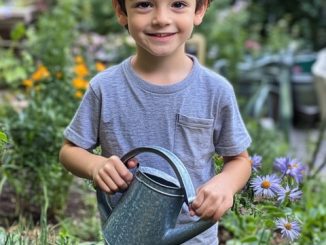For years, Annie Windley, a young woman from Derbyshire, England, battled one of the most harrowing challenges of her life: anorexia. Her eating disorder reduced her daily intake to a single piece of bread, leaving her physically frail and emotionally exhausted. But Annie’s story isn’t just one of struggle—it’s also one of hope, resilience, and transformation. Today, she shares her journey to recovery, inspiring others to fight their own battles against eating disorders.
The Reality of Struggling with Eating Disorders

Millions of people around the world face eating disorders, often in silence. Despite movements encouraging body positivity and self-love, the pressure to conform to unrealistic standards remains a pervasive issue. Annie’s story sheds light on the severe toll that such disorders can take, not just on the body but on the mind and spirit as well.
Anorexia isn’t simply about food—it’s about control, self-perception, and often, deep-rooted emotional pain. For Annie, it began subtly but soon spiraled into a life-threatening condition.
Annie’s Life During the Darkest Days
Annie’s battle with anorexia started when she was just 14 years old. By the time she was 21, her weight had plummeted to an alarming 29 kilograms (63 pounds). She subsisted on a single piece of bread most days, pushing her body to the brink of collapse.
The Physical Toll
Annie’s dangerously low weight brought on a cascade of medical complications:
- Severe malnutrition left her prone to fainting and weakness.
- Heart risks put her at a constant threat of cardiac arrest.
- Her immune system was so weakened that minor illnesses became serious threats.
Emotional and Mental Struggles
The emotional toll was equally devastating. Annie felt trapped in a cycle of self-loathing and obsessive thoughts about food and her body. “It wasn’t just my weight,” she shared. “It was my mindset—anorexia consumed every part of my life.”
The Turning Point: Choosing to Fight Back
In 2017, Annie made a pivotal decision to fight back against her eating disorder. While she had attempted recovery before, something changed this time—it wasn’t for her family, her friends, or her doctors. It was for herself.
“I can’t say exactly what happened, but this time, it was just for me,” she explained.
The Road to Recovery
Annie’s recovery wasn’t easy. Each day was marked by excruciating effort and an extraordinary amount of courage. She underwent hospitalization, intensive therapy, and medical treatments to regain her health.
In one of her most poignant social media posts, Annie wrote, “Rehabilitation is a breathtaking process that should be thrilling, unforgettable, and amazing. I believe my anorexia will always be a part of me, but I’ve learned to control it and stop letting it control me.”
How Running Changed Her Life

One of the most transformative parts of Annie’s recovery was discovering her love of running. At first, running became a healthy outlet to redirect her focus from food restrictions to something empowering.
In October, she completed the Chesterfield Half Marathon—a milestone that symbolized not just her physical strength but her mental resilience.
“Running gave me a purpose again,” she shared. “It taught me that my body is capable of incredible things, and I needed to nurture it rather than punish it.”
Lessons Learned on the Journey to Self-Love
Through her recovery, Annie came to realize that true happiness doesn’t come from meeting societal standards of beauty—it comes from how you treat yourself and others.
The Power of Self-Compassion
Annie emphasizes that recovery is about more than gaining weight; it’s about changing how you view yourself and your worth. “I’ve learned that how you treat yourself matters far more than how you look,” she says.
Finding Strength in Vulnerability

Sharing her story publicly wasn’t easy, but Annie knew it was necessary. Her honesty has resonated with many others who feel isolated in their struggles with eating disorders.
“Changing for the better is never too late,” she reminds her followers. “We don’t want to spend our lives feeling unhappy or regretting the things we couldn’t do because of anorexia.”
Annie’s Life Today: A Story of Hope
Now, Annie is thriving. She’s gained over three stone (42 pounds) in her recovery journey and has reached her healthiest weight since 2014. More importantly, she’s cultivated a healthier relationship with her body and food.
She admits that anorexia will always be a part of her, but it no longer controls her. “I’ve learned to live with it, not let it rule my life,” she explains.
Annie continues to focus on her love of running and encourages others to find their own sources of strength and joy.
Spreading Awareness and Inspiring Others
Annie’s story is more than just a personal victory—it’s a beacon of hope for others struggling with eating disorders. By sharing her journey, she aims to break the stigma surrounding these conditions and show that recovery is possible.

Her message to anyone going through a similar battle is simple yet profound: “Pay attention to what drives you and use it to move forward. You’re stronger than your disorder.”
Conclusion: A Journey of Resilience and Transformation
Annie Windley’s story is a testament to the power of resilience and the human spirit. From surviving on a single piece of bread a day to completing a half marathon, her journey reminds us that recovery is possible with determination, support, and self-love.
Her transformation inspires us to approach our own challenges with courage and to support those who might be fighting battles we cannot see. Annie’s words say it best: “Changing for the better is never too late.”
Let her story serve as a call to action for compassion, awareness, and perseverance. If you or someone you know is struggling with an eating disorder, take heart—help is available, and healing is possible.


